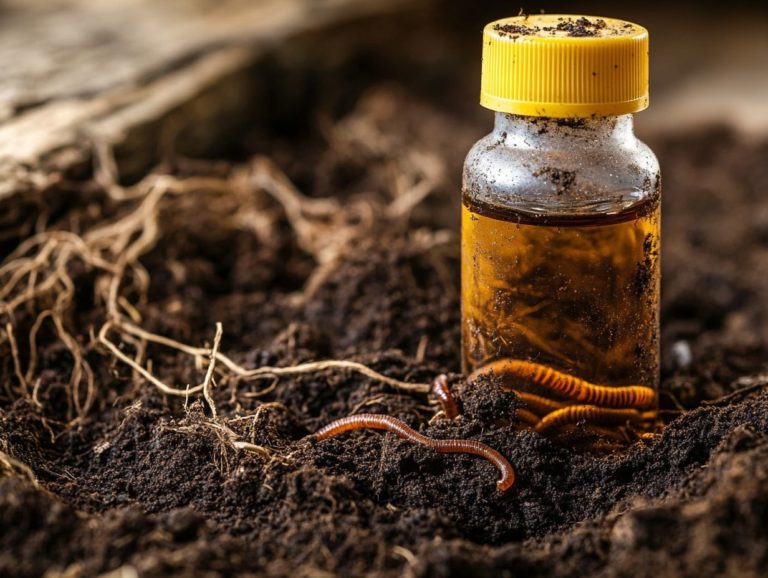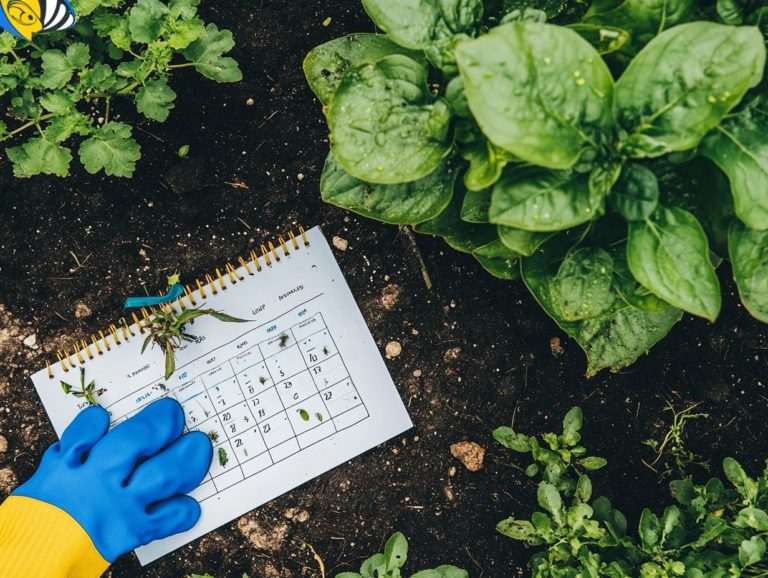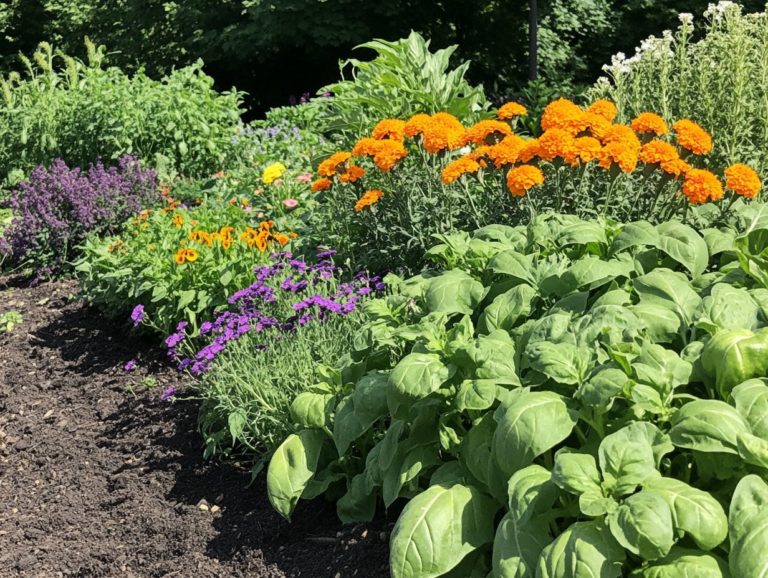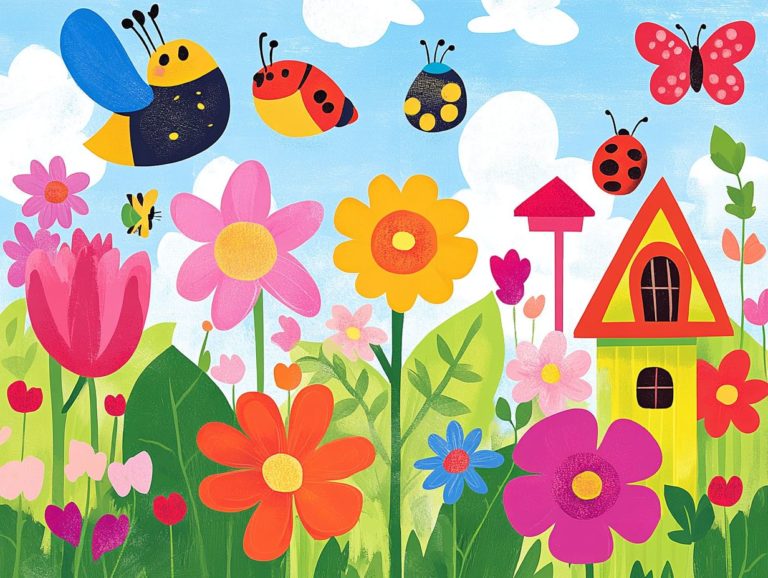5 Simple Pest Control Hacks for Gardeners
Gardening is rewarding, but pests can quickly turn joy into frustration. Thankfully, you can use natural methods to protect your plants without harsh chemicals.
This article covers five simple pest control hacks you can easily apply. These strategies include companion planting, physical barriers, natural sprays, and maintaining garden hygiene.
Explore these tips and enjoy a vibrant, pest-free garden!
Contents
- Key Takeaways:
- 1. Use Companion Planting to Repel Pests
- 2. Attract Beneficial Insects
- 3. Create Physical Barriers
- 4. Make Your Own Natural Pest Sprays
- 5. Practice Good Garden Maintenance
- What Are the Most Common Garden Pests and How Can They Be Controlled?
- Frequently Asked Questions
- What are 5 simple pest control hacks for gardeners?
- How can companion planting help with pest control in the garden?
- Is it possible to make a DIY pest spray that is safe for my garden?
- How do beneficial insects help with pest control in the garden?
- What is crop rotation and how does it help with pest control?
- Are physical barriers an effective method of pest control in the garden?
Key Takeaways:

- Companion planting naturally repels pests. For example, marigolds keep mosquitoes and aphids away.
- Attract beneficial insects like ladybugs to help manage pest populations safely.
- Create physical barriers like fencing to prevent pests from entering your garden.
1. Use Companion Planting to Repel Pests
Companion planting is a popular gardening method that pairs different plants to repel pests and boost growth. By using nature s relationships, this method enhances organic gardening and pest control.
For instance, planting marigolds with tomatoes deters aphids. Pairing cabbage with dill or yarrow helps keep cabbage worms away. These plant pairings decrease reliance on chemical pesticides while enriching biodiversity, the variety of plant and animal life essential for healthy soil.
When you attract beneficial insects like ladybugs and lacewings, they will help control pests naturally.
By using these organic techniques, you create a vibrant, eco-friendly landscape that thrives.
2. Attract Beneficial Insects
Bringing beneficial insects into your garden is vital for organic pest control. Allies like ladybugs and lacewings manage pests and enhance garden health.
These insects also pollinate, aiding the growth of flowering plants. Plant a variety of species like marigolds, dill, and sunflowers to provide nectar and pollen.
Avoid harmful insecticides that can eliminate these helpful allies. By creating a diverse habitat with different plant heights, you can offer shelter and breeding sites, supporting a thriving ecosystem.
3. Create Physical Barriers
Physical barriers are an effective way to control pests in organic gardening. They protect your flowering plants from slugs, snails, and other intruders, preserving your garden’s health.
Row covers are lightweight fabric sheets that shield crops from insects while allowing sunlight and moisture to reach them. Copper tape can be placed around pots or beds to create an electric barrier against slugs, as they naturally avoid copper.
Using these barriers reduces reliance on chemical pesticides and encourages beneficial insects. Including a variety of barriers in your garden strategy helps you maintain vibrant plants while minimizing pest threats.
4. Make Your Own Natural Pest Sprays

Creating your own natural pest sprays is rewarding. Use neem oil, essential oils, and a dash of dish soap to craft eco-friendly solutions that protect your plants.
When you blend these organic ingredients, you re not just keeping pests at bay; you re nurturing a healthier ecosystem right in your backyard. Neem oil, extracted from the seeds of the neem tree, disrupts the life cycles of various insects. Garlic s potent aroma acts as a strong deterrent to unwelcome guests.
Incorporating these homemade remedies into your gardening routine champions a chemical-free approach and aligns with sustainable practices that benefit the environment. For instance, you can explore the top 5 natural pest deterrents for your garden. This holistic method fosters biodiversity and protects beneficial insects, essential for thriving plant health.
5. Practice Good Garden Maintenance
Practicing good garden maintenance is essential for your organic gardening success. It enhances soil structure, promotes healthy plant growth, and plays a pivotal role in preventing and controlling pest populations.
Establishing a consistent watering schedule ensures that your plants receive the moisture they need without becoming waterlogged. This fosters robust root systems. Regularly weeding your garden prevents competition for nutrients and water, allowing your desired plants to flourish.
Applying mulch effectively helps retain moisture in the soil and suppresses weed growth. This creates a healthier environment for your plants. Coupling these practices with compost and natural fertilizers enriches the soil with vital nutrients and contributes to a balanced ecosystem that attracts beneficial insects while deterring harmful pests.
Ultimately, these fundamental practices support a thriving garden and significantly minimize the risk of infestation, including ways to encourage pollinators and control pests.
What Are the Most Common Garden Pests and How Can They Be Controlled?
Understanding the most common garden pests like aphids, cabbage worms, and mosquitoes is essential for effective pest control and embracing organic gardening practices. Familiarizing yourself with the top 5 pest control techniques for vegetables enables you to tackle challenges proactively and sustainably.
When you spot their unique traits, you can act quickly! For example, aphids are tiny and reproduce rapidly, while cabbage worms have distinctive stripes. These pests can wreak havoc by feeding on tender plant tissues, causing stunted growth or, in the worst cases, plant death. Fortunately, several eco-friendly methods exist to keep them at bay.
Utilizing neem oil can disrupt pest life cycles while remaining safe for beneficial insects. Other natural solutions include:
- Introducing predatory insects
- Employing physical barriers
- Practicing companion planting
These methods work together to create a balanced ecosystem that discourages pest outbreaks, ensuring your garden thrives.
How Can Companion Planting Help with Pest Control?
Companion planting can be a game-changer for your pest control efforts. By strategically placing plants together, you can deter harmful pests while attracting beneficial insects. For more effective strategies, explore natural pest control methods for your garden, which create a harmonious balance in your organic gardening practices.
Take marigolds and tomatoes, for example. This classic pairing is popular because marigolds release a strong scent that keeps nematodes and other unwanted pests at bay. Planting basil alongside your tomatoes enhances the fruit’s flavor and wards off pesky whiteflies and aphids.
The magic lies in natural plant chemicals those remarkable substances produced by plants that repel pests or attract helpful allies like ladybugs and lacewings. These plant combinations work together synergistically, fostering a healthier garden ecosystem and reducing your reliance on chemical pesticides.
Which Beneficial Insects Can Help Control Garden Pests?

Several beneficial insects are your garden’s silent guardians. They play an essential role in controlling pests and enhancing your organic gardening experience.
These remarkable allies think ladybugs and predatory wasps help maintain a balanced ecosystem by feasting on harmful pests like aphids and caterpillars. For instance, a single ladybug can devour up to 5,000 aphids over its lifetime, making it invaluable for safeguarding your plants. Predatory wasps lay eggs inside pest insects, keeping those pesky populations in check.
To attract these beneficial species, plant vibrant flowers like marigolds and dill. They provide nectar and create a welcoming habitat, turning your garden into a hotspot for natural predators.
What Are Some Examples of Physical Barriers for Pest Control?
Effective physical barriers are your best bet to protect your exquisite flowering plants from slugs, snails, and other unwelcome guests while adhering to organic gardening principles.
Tools like floating row covers create a protective shield that allows sunlight and moisture through but keeps pests at bay. Netting effectively blocks birds and larger insects from munching on your delicate seedlings.
Don’t overlook copper tape it’s a smart deterrent! When slugs and snails touch it, they receive a gentle electric shock, prompting them to steer clear of your garden. Each of these barriers is crucial for your overall garden care strategy, ensuring your plants flourish while reducing the need for chemical interventions and insecticides.
How Can Natural Pest Sprays Be Made at Home?
Making your own natural pest sprays at home is quick and easy! Use ingredients like neem oil and essential oils to maintain pest control in your organic gardening endeavors. For additional strategies, consider these 5 simple ways to prevent pest infestations and try using garlic as a powerful natural deterrent!
This method harnesses nature’s power, providing a safe and eco-friendly alternative to chemical pesticides. For example, neem oil, extracted from the neem tree seeds, has remarkable insect-repellent properties that disrupt the life cycle of pesky invaders like aphids and cabbage worms. Essential oils such as rosemary or peppermint not only enhance your garden’s scent but also repel unwanted insects with their potent compounds.
By following a few simple steps like mixing these oils with water and a natural emulsifier (a substance that helps mix oil and water) you can create sprays that deter a broad spectrum of pests. Adding some dish soap to your mix boosts effectiveness!
What Are Some Good Garden Maintenance Practices for Pest Control?
Good garden maintenance practices are essential for effective pest control, enhancing soil structure, and promoting healthy plant growth. For those looking to further minimize the risk of pest infestations, following these 5 steps to create a pest-resistant garden in your organic garden can be highly beneficial.
Regular weeding keeps your garden pristine and reduces competition for nutrients and water, allowing your plants to thrive. Proper watering techniques, such as morning watering, ensure your plants get sufficient moisture without over-saturating the soil, which can lead to root rot and attract pests.
Using compost and natural fertilizers like eggshells and coffee grounds enriches the soil with vital nutrients, fostering strong, resilient plants. These practices help cultivate a harmonious ecosystem that naturally deters pests, resulting in a vibrant and flourishing garden.
Frequently Asked Questions

Have questions? Here are some common inquiries about pest control and organic gardening!
- What are some effective natural deterrents? Garlic, neem oil, and certain essential oils can help.
- How can I attract beneficial insects? Plant flowers like marigolds and dill.
- What should I do if pests invade my garden? Use physical barriers and natural sprays to manage them.
Try out these suggestions and enhance your gardening experience!
What are 5 simple pest control hacks for gardeners?
-
Use companion planting: Certain plants can repel pests naturally. For example, marigolds repel aphids and nematodes, while tomato leaves deter unwanted guests.
-
Make your own organic pest spray: Mix equal parts water and dish soap, then add a few drops of peppermint essential oil. This safe solution helps keep pests at bay without harmful chemicals.
-
Encourage beneficial insects: Attract ladybugs, lacewings, and praying mantis to your garden by planting flowers they love, like marigolds, and providing a water source.
-
Practice crop rotation: Change what you plant in each area every season. This disrupts pest breeding and reduces infestations, helping you learn how to create a pest-free zone in your garden.
-
Use physical barriers: For larger pests like rabbits or deer, use netting or fencing around your garden. It’s a sustainable way to protect your organic gardening practices!
How can companion planting help with pest control in the garden?
Companion planting means planting different plants together that help each other grow and repel pests. For instance, marigolds alongside tomatoes deter aphids, while garlic with roses keeps pests like Japanese beetles away.
Is it possible to make a DIY pest spray that is safe for my garden?
Yes! You can easily create an organic pest spray by mixing equal parts water and dish soap, then adding a few drops of peppermint essential oil. This safe and cost-effective solution helps keep pests at bay without harmful chemicals.
How do beneficial insects help with pest control in the garden?
Beneficial insects like ladybugs and lacewings eat common garden pests. By attracting them with specific plants, such as those listed in the top 5 pest-resistant plants for your garden, and providing water, you can keep pest populations in check naturally.
What is crop rotation and how does it help with pest control?
Crop rotation is simply changing what you plant in different spots each season. This prevents pests from building up in the soil and helps keep your garden healthy.
Are physical barriers an effective method of pest control in the garden?
Absolutely! Physical barriers like netting or fencing effectively keep larger pests out. This sustainable option not only protects your plants but also shields them from harsh weather.
Start implementing these hacks today for a healthier, pest-free garden!






